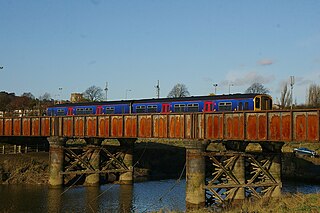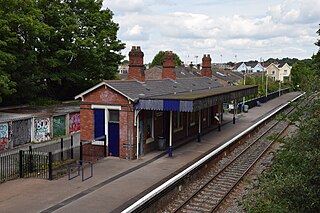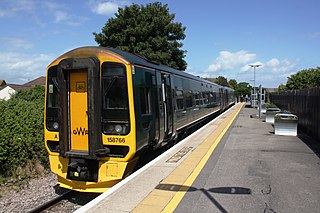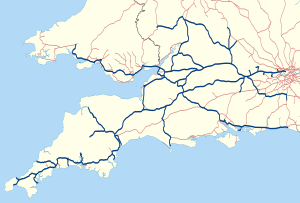
Bristol Parkway, on the South Wales Main Line, is in the Stoke Gifford area in the northern suburbs of the Bristol conurbation. It is 112 miles (180 km) from London Paddington. The station was opened in 1972 by British Rail, and was the first in a new generation of park and ride/parkway stations. It is the third-most heavily used station in the West of England local authority area, after Bristol Temple Meads and Bath Spa. There are four platforms, and a well-equipped waiting area. The station is managed by Great Western Railway, who provide most of the trains at the station, with CrossCountry providing the rest.

Virgin Trains was a train operating company in the United Kingdom owned by Virgin Rail Group, a joint venture between Virgin Group and Stagecoach, which operated the InterCity West Coast franchise from 9 March 1997 to 7 December 2019. The franchise covered long-distance passenger services on the West Coast Main Line between London, the West Midlands, North West England, North Wales and Scotland, consequently connecting six of the UK's largest cities: London, Birmingham, Liverpool, Manchester, Glasgow and Edinburgh, which have a combined metropolitan population of over 18 million. Virgin Trains had around 3,400 employees in 2015.

Crossrail is a railway construction project centred around London. Its aim is to provide a high-frequency hybrid commuter rail and rapid transit system crossing the capital from suburbs on the west to east, by connecting two major railway lines terminating in London: the Great Western Main Line and the Great Eastern Main Line. The project was approved in 2007, and construction began in 2009 on the central section and connections to existing lines that became part of the route, which has been branded the Elizabeth line in honour of Queen Elizabeth II who opened the line on 17 May 2022 during her Platinum Jubilee. The central section of the line between Paddington and Abbey Wood opened on 24 May 2022, with 12 trains per hour running in each direction through the core section in Central London.

The Great Western Main Line (GWML) is a main line railway in England that runs westwards from London Paddington to Bristol Temple Meads. It connects to other main lines such as those from Reading to Penzance and Swindon to Swansea. Opened in 1841, it was the original route of the first Great Western Railway which was merged into the Western Region of British Railways in 1948. It is now a part of the national rail system managed by Network Rail with the majority of passenger services provided by the current Great Western Railway franchise.

Great Western Railway (GWR) is a British train operating company owned by FirstGroup that operates the Greater Western passenger railway franchise. It manages 197 stations and its trains call at over 270. GWR operates long-distance inter-city services along the Great Western Main Line to and from the West of England and South Wales, inter-city services from London to the West Country via the Reading–Taunton line, and the Night Riviera sleeper service between London and Penzance. It also provides commuter and outer-suburban services from its London terminus at Paddington to West London, the Thames Valley region including parts of Berkshire, parts of Buckinghamshire and Oxfordshire; and regional services throughout the West of England and South Wales to the South coast of England. Great Western Railway also provides and maintains the Electrostar Class 387 fleet for Heathrow Express.

First Great Western Link (FGWL) was a train operating company in England owned by FirstGroup that operated the Thames franchise from April 2004 until March 2006.

The Severn Beach line is a local railway line in Bristol and Gloucestershire, England, which runs from Bristol Temple Meads to Severn Beach, and used to extend to Pilning. The first sections of the line were opened in 1863 as part of the Bristol Port Railway and Pier; the section through Bristol was opened in 1875 as the Clifton Extension Railway.

Clifton Down railway station is on the Severn Beach line and serves the district of Clifton in Bristol, England. It is 3.9 miles (6.3 km) from Bristol Temple Meads. Its three letter station code is CFN. The station has two platforms, each serving trains in one direction only. As of 2015 it is managed by Great Western Railway, which is the third franchise to be responsible for the station since privatisation in 1997. They provide all train services at the station, mainly a train every 30 minutes in each direction.

Redland railway station is on the Severn Beach Line and serves the districts of Cotham and Redland in Bristol, England. It is 3.3 miles (5.3 km) from Bristol Temple Meads. Its three letter station code is RDA. As of 2015 it is managed by Great Western Railway, which is the third franchise to be responsible for the station since privatisation in 1997. They provide all train services at the station, mainly a train every 30 minutes in each direction.

Severn Beach railway station serves the village of Severn Beach, England. This is the terminus of the Severn Beach Line.

The period from 1995 covers the history of rail transport in Great Britain following the privatisation of British Rail. During this period, passenger volumes have grown rapidly, safety has improved, and subsidies per journey have fallen. However, there is debate as to whether this is due to privatisation or to better government regulation. During this period, High Speed 1, the West Coast Main Line upgrade and Crossrail were completed and more construction projects are currently under way. The period also saw the demise of privately-owned Railtrack and its replacement with government-owned Network Rail.

High Speed 2 (HS2) is a planned high-speed railway line in England, the first phase of which is under construction in stages and due for completion between 2029 and 2033, depending on approval for later stages. The new line will run from its southern terminus in London to its most northerly point, Manchester, with branches to Birmingham and the East Midlands. HS2 will be Britain's second purpose-built high-speed line, the first being High Speed 1, which connects London to the Channel Tunnel.

Passenger rail franchising in Great Britain is the system of contracting the operation of the passenger services on the railways of Great Britain to private companies, which has been in effect since 1996 and was greatly altered in 2020, with rail franchising being effectively abolished in May 2021.

InterCity West Coast (ICWC) was a 1997–2019 railway franchise in the United Kingdom for passenger trains on the West Coast Main Line, between London Euston, the West Midlands, North Wales, Liverpool, Manchester, Carlisle, Edinburgh, Glasgow, and other major destinations between.

Essex Thameside is a railway contract, and former franchise, for the provision of passenger services on the London, Tilbury and Southend line in east London and south Essex. It was formed on 26 May 1996, following the privatisation of British Rail and the franchise was originally called London, Tilbury and Southend. The only train operating company on the line to date has been c2c. Following a number of temporary extensions caused by problems with the rail franchising system, c2c was awarded a new 15-year franchise which commenced on 9 November 2014.

Virgin Rail Group was formed by the Virgin Group to bid for rail franchises in the United Kingdom during the privatisation of British Rail in the late 1990s.

The East Anglia franchise is a railway franchise for passenger trains on the Great Eastern Main Line and West Anglia Main Lines in England. It commenced operating in April 2004 when the Anglia and Great Eastern franchises, together with the West Anglia part of the West Anglia Great Northern franchise, were combined to form the Greater Anglia franchise.

South Western is a railway franchise for the provision of passenger services from London Waterloo to destinations in Surrey, Hampshire, Somerset, Dorset, Berkshire, Wiltshire and Devon on the South West, Portsmouth Direct and West of England main lines. In 2007, the franchise was combined with the smaller franchise for the Island Line on the Isle of Wight.
The West Coast Partnership (WCP) is a railway franchise in the United Kingdom for passenger trains on the West Coast Main Line (WCML), between London Euston, the West Midlands, Shropshire, North Wales, Liverpool, Manchester, Carlisle, Edinburgh and Glasgow. Founded in December 2019, it is currently operated by First Trenitalia West Coast Rail Limited, comprising two distinct parts, Avanti West Coast which runs the current services on the WCML, and West Coast Partnership Development, which is the 'shadow operator' for future high-speed services.

Avanti West Coast is a train operating company in the United Kingdom owned by FirstGroup (70%) and Trenitalia (30%) that operates the West Coast Partnership.





















